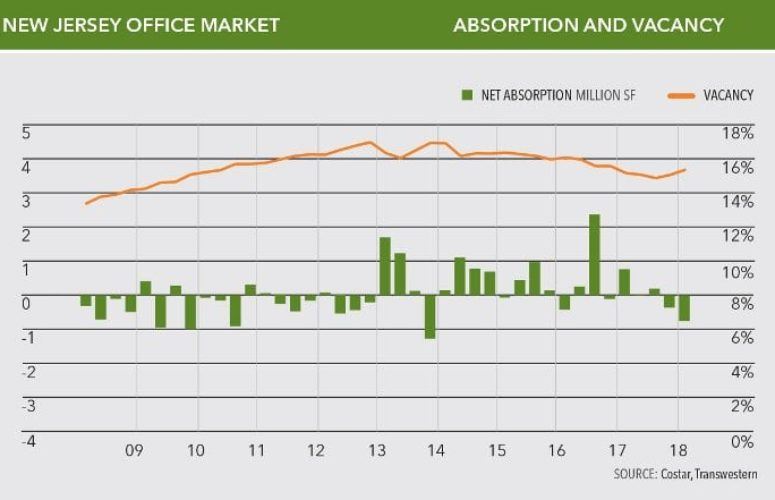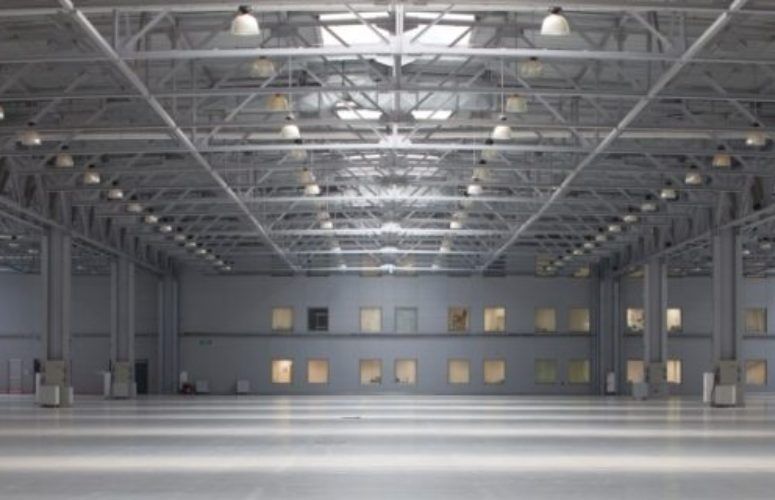
New Jersey Office Market Flourishes with 4th Consecutive Year of Positive Net Absorption
On Jan 13, 2017New Jersey’s office market experienced its fourth consecutive year of positive net absorption in 2016, with tax incentives attracting companies from Manhattan and top industries taking advantage of the state’s large talent pool and newly repositioned suburban assets. According to Transwestern’s Fourth-Quarter 2016 Office Market Report, since the start of 2013, there has been approximately 8 million square feet of positive net absorption in the market, with 2016 accounting for 1.8 million square feet.
After experiencing its strongest summer in 13 years, the market stabilized during the fourth quarter. While the total number of lease transactions increased quarter over quarter, the market’s vacancy rate remained steady at 15.5 percent. Asking rents increased for the fifth time in six quarters to $26.16 per square foot – the highest level since third quarter 2008.
Companies continue to relocate operations from New York City to the Hudson Waterfront. For example, British financial services firm Fidessa signed a 78,000-square-foot lease after being awarded a $31 million Grow New Jersey tax incentive. Meanwhile, women’s fashion retailer Tory Burch, which already occupies a large distribution facility in Central New Jersey, has been offered an $11 million Grow New Jersey incentive package to relocate its back-office operations.
“A diverse cross-section of companies leased space during the fourth quarter, helping push positive net absorption to a higher level than 2015,” said Matt McDonough, managing director at Transwestern. “While many of the largest deals of the fourth quarter were either a renewal or expansion, an increased number of small to mid-sized transactions upheld the market activity.”
Fourth-quarter leasing activity was highlighted by:
- Synchronoss Technologies Inc. expanded its footprint at 200 Crossing Blvd. in Bridgewater to 118,691 square feet, which will likely be used to accommodate the engineering and information technology workers relocating from Pennsylvania’s Lehigh Valley. Having been based in Bridgewater for more than a decade, the cloud solutions and software-based activation provider has not received state incentives, but rather continually cites New Jersey’s strong base for technology and telecommunications talent as its impetus for remaining.
- Also in Bridgewater, Allstate Insurance Company leased approximately 63,000 square feet at CenterPointe, an office park that has recently undergone a major capital improvement program.
- Electric utility company JCP&L is moving its regional headquarters from Red Bank to nearby Bell Works, the flourishing mixed-use redevelopment in Holmdel.
- Connell Foley also made a decision to remain in Roseland but is relocating to the recently modernized 56 at Roseland property.
The Transwestern report goes on to state that leasing activity should remain steady in 2017, as companies expect to see continued increases in hiring, wages, profits and sales, according to the annual New Jersey Business & Industry Association Business Outlook Survey.
“While the office stock in New Jersey has steadily improved, resulting in an increasing number of companies expanding their presence or moving employees here from neighboring states, the State of New Jersey is addressing the issues related to the outward migration of baby boomers and millennials,” said Matthew Dolly, research director. “The former strengthens our economy by spending money locally, and the latter will help grow business.”
While there is general optimism that the election of Donald Trump should result in a pro-business tax reform, it remains somewhat of an economic struggle for some companies and residents to remain in New Jersey, in large part due to price of healthcare, property taxes and the cost of doing business. Furthermore, while the presidential election has passed, New Jersey still has to contend with an upcoming gubernatorial election, as well as state senate and general assembly elections.
Related Articles:





